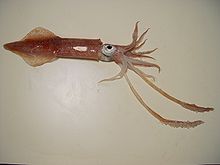Tag Archives: hearing
Squids Could Hold Key To Providing Valuable Answers Into The Origin and Evolution of Hearing
Loligo pealeii, an ordinary run of the mill squid – most famous for being a source of food for many creatures in the sea – might just become a VIP in the science world, as it is making waves by providing tidbits and insights into the origin and evolution of the sense of hearing.
The Woods Hole Oceanographic Institution, housed in a militaristic style building, is home to T. Aran Mooney, a biologist who is exploring the interesting theory: Can squid hear? Can they actually hear predators or enemies coming up on them? How do squid and other aquatic animals depend on sound to communicate, migrate, and interact on a day to day basis? Will the increasing amount of noise pollution we are pumping into the world’s oceans have a catastrophic effect on the squid, and other animals hearing ability, and ultimately, their survival?
“The sound in the ocean is increasing…commercial shipping, oil and gas exploration…those make a lot of noise,” Mooney explains. “And you don’t know how that is going to affect the animal unless you know what it hears.”
A postdoctoral scholar at WHOI, Mooney, has taken it upon himself to partake in seminal investigations into the hearing of the squid. His results were recently released this past Friday in the Journal of Experimental Biology.
This research has taken on a whole new light, as many aquatic animals rely on the squid, and if we are endangering its hearing ability, we are not only endangering our chances of finding out more about the development of the sense of hearing, but we could potentially throw the whole balance of the world’s oceans out of whack.
Babelfish?
First of let me say that I am sorry for the lack of post these last weeks. Internet problems. Will hopefully be back to normal soon. Now to the story
Hearing impairment caused by damage to hail cells in the inner ear is by far the most common cause of hearing loss, but research carried out on Zebrafish might be able to show us how these hair cells can be re-grown.
Scientists involved in the experiments say there could be therapeutic trials to prevent hearing loss using drugs within a decade, while finding a cure for hearing loss using hair-cell regeneration is probably at least 20 years away.
Hair cells in the inner ear can be damaged by a long row of factors, such as noise, drugs, disease and ordinary aging. Once a hair cell dies, mammals – including us humans – aren’t able to replace that hair cell with a new one. Until the mid-1980’s, researchers thought that this was true for all warm-blooded vertebrates, but we now know that birds are able to grow new hair cells and that this hair-cell regeneration can result in improved hearing.
Among the so called cold-blooded animals, aquatic creatures like the zebrafish are equipped with clusters of hair cells running along the outside of the body to help the animal sense vibrations in the water. Just like the birds, zebrafish are capable of regenerating these hair cells if there’re damaged and this has attracted the attention of U.S. researchers looking for a cure for hearing loss.
Why some animals can regenerate hair cells while other can’t, and why some animals – even within the same species – are more vulnerable to hair-cell death, remains a mystery.
“I literally walked around for years wondering about this variability,” says Ed Rubel, a professor of hearing sciences who leads part of a University of Washington research effort in Seattle.
The Seattle research teams are currently using zebrafish to gain a better understanding of hair cell generation in hope of figuring out how to protect human hair cells from becoming damaged and how to stimulate the cells to regenerate. The project is focused on understanding the molecules and genetics involved with hair cell regeneration, and how to mimic this process in animals that don’t spontaneously regenerate hair cells.
In collaboration with Dr. David Raible, another University of Washington scientist, Professor Rubel has already identified chemicals that seem to protect hair cells from damage. Those chemicals are now being tested on mice and rats to see if they will have an affect on warm blooded mammals and not just on zebrafish. The goal is to develop a medicine that can be administered to patients receiving drugs known to kill hair cells, e.g. chemotherapeutic agents.
Dr. Rubel’s and Dr. Raible’s teams also are studying the genetics of zebrafish to identify markers that confer hair-cell protection. The teams are also working on a separate group of studies regarding the genes and other molecules that make the regeneration of hair cells possible in zebrafish, birds and mice. In 2008, the teams jointly indentified several genetic mutations and drug-like compounds that seemed to protect hair cells from death, publishing their findings in the journal PLoS Genetics.
In addition to this, Dr. Rubel’s lab is investigating the role of the so called support cells; cells that surround the hair cells and are capable of both turning into hair cells and generate new hair cells. “If we understand the template of genes that are expressed by the cells we would want to divide, then we could tap into that template to mimic regeneration efforts in mammals”, Dr. Rubel explains.
How do hair cells work?
Hair cells are called hair cells since they look like cells with little hairs growing out of them when you look at them through a microscope. Hair cells are found in our inner ears and damage to these cells is a major cause of irreversible hearing loss. The filament hairs, also known as cilia, bend as sound waves enter the ear, prompting the hair cell to send an electrical signal to the auditory nerve from which it continues to the brain.
